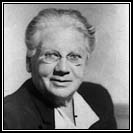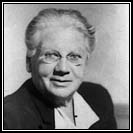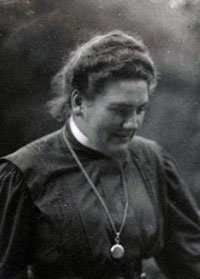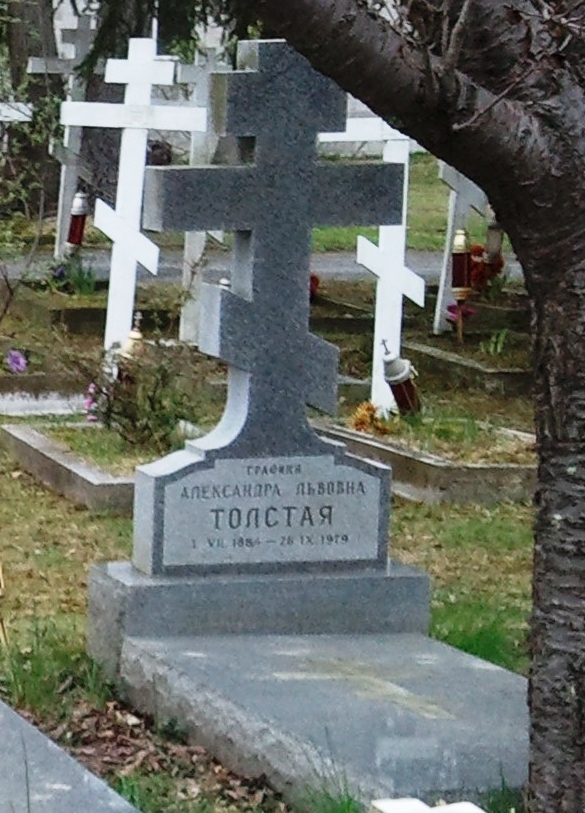Alexandra L. Tolstoy – the organizer and the president of the Tolstoy foundation
The countees Alexandra L. Tolstoy, the youngest daughter of Leo Tolstoy, – the famous Russian writer and thinker,– was born in Russia at Yasnay Polyana (the Tolstoy country home now transformed into a national museum) on July 1,1884.
Alexandra became her father's secretaty, his co-worker, and after his death (in 1910), the executor of his estate, distributing and publishing his writings.
She was permitted to leave Soviet Russia in 1929 after five arrests and a prison. She settled in the United States in 1931 and recieved USA citizenship in 1941.
In April 1939, at the initiative of Alexandra Tolstoy and her long – time friend, Tatiana Schaufuss, with a group of notable Russian exiles: artists, intellectuals, scientists, professional people and sponsors joined to form the organization devoted to the relief of Russian refugees from World War I and to create a center of Russian culture in America. Among them were former President of the USA Herbert Hoover, former Russian Ambassador Prof. Boris Bakhmeteff, Prof. Michael Rostovtzeff, the composer and pianist Serge Rakhmaninoff, the avia constructor Igor Sikorsky, the flying ace Captain Boris Sergievsky and his wive Gertrude, Dr. Ethan Colton and others. It was decided to name the organization after the great Russian author, philosopher and humanitarian, Leo Tolstoy. Alexandra Tolstoy became the president of this Foundation, Herbert Hoover – the Honorary Chairman.
When the World War II began, the Tolstoy Foundation became involved in assistance to refugees and prisoners of war in Europe. With the assistance of the Bible Society and the American Red Cross, food, clothing, Russian Bibles and Orthodox crosses were shipped to France and to Finland.
In November 1939 the USSR attacked Finland. During 4 months 50 thousand of Soviet soldiers were prisoned. They were not taken care of by the motherland.
In the course of World War II, the Tolstoy Foundation's mission and activities expanded and included urgent relief and assistence to other victims of presecution and oppression - refugees, displaced persons and prisoners of war.
Alexandra Tolstoy worked to effect changes in U.S. immigration laws. In 1948, she testified before the House Judiciary Committee in favor of the Displaced Person Act and was instrumental in its passage.
The Tolstoy Foundation worked in constant cooperation with various European governmental representatives, as well as with the United Nations High Commissioner for Refugees and officials of the United States Escape Program.
After the Second War Alexandra Tolstoy together with Tatiana Schaufuss, Executive Vice President, expanded the Foundation's work in Europe, the Middle East, Canada and South America. They helped to tens thousands of Russian refugees (among them many Russian scientists) and arranged their resettlement in the United States.
As the President of Tolstoy Foundation for 40 years, Alexandra Tolstoy lived and worked actively at the Tolstoy Foundation Center in Valley Cottage near New York (state of New York). Being energetic all her life, with a remarkable calmness of spirit, Alexandra Tolstoy was named "the heart" and "the soul" of the Foundation. Tolstoy Foundation became a real center of Russian culture in the USA. In 1941, a generous private donation made it possible to acquire Reed Farm, a 70 - acre piece of land about 36 miles north of New York City. The Farm became a haven and re-settlement center for over 14 000 refugees, of all ages and backgrounds, arriving in the United States under the sponsorship of Tolstoy Foundation. Here the new arrivals were able to develop some psychological equilibrium, to learn English and skills necessary to start thier new life in America.
In 1970, Alexandra Tolstoy and Tatiana Schaufuss founded Tolstoy Foundation Nursing Home in Valley Cottage. There is also a Library, an Archive and a church there. The library contains more than 40000 volumes in Russian and in English. The Russian Orthodox church, built in 1957, is dedicated to St. Sergius of Radonezh. It is a beautiful structure in classic Pscov - Novgorod style, decorated inside with frescoes, carved chandeliers and carved and painted icon screen. The church is a beloved addition to the Center's community.
Alexandra Tolstoy was successful not only as the Foundation President and also as a fundraiser, a lecturer, and a writer. She spoke and wrote against all forms of human rights abuse and in defense of dissidents and other persecuted Soviet citizens. Alexandra Tolstoy had a great will power to take part in the scientific projects of Russian academic group in the USA and the Russian Publiting Fund and others. Alexandra Tolstoy published many books (" I worked for the Soviets", 1934; " Father. Leo Tolstoy's life", 1953 and others). Though Alexandra Tolstoy hadn't her own family she had many relatives in Sweden, France, Soviet Russia and in the United States. Many of them met at the "Aunt Sasha" 90th anniversary in 1974. Alexandra Tolstoy was active until 1976. She died in 1979 at the age 96 and buried in Novo - Diveevo. This cemetry is located near Tolstoy Farm.
http://en.wikipedia.org/wiki/Alexandra_Tolstaya
Alexandra (Sasha) Lvovna Tolstaya (Russian: Александра Львовна Толстая; 18 July 1884 – 26 September 1979) was the youngest daughter and secretary of the noted Russian novelist Leo Tolstoy.[1][2][3][4]
Although Alexandra Lvovna shared with her father the doctrine of non-violence, she felt it was her duty to take part in the events of World War I. For her courage, the Russian government awarded her three St George Medals and the rank of colonel.
The Bolsheviks imprisoned Alexandra in 1920, but she was installed as the director of the Tolstoy museum in Yasnaya Polyana the next year. She left Soviet Union in 1929, and settled in the United States, where she founded the Tolstoy Foundation.
In later years, she helped many Russian intellectuals (notably Vladimir Nabokov and Sergei Rachmaninoff) to escape Bolshevik persecution and to settle in America.
http://en.wikipedia.org/wiki/Alexandra_Tolstaya
Alexandra L. Tolstoy – the organizer and the president of the Tolstoy foundation
The countees Alexandra L. Tolstoy, the youngest daughter of Leo Tolstoy, – the famous Russian writer and thinker,– was born in Russia at Yasnay Polyana (the Tolstoy country home now transformed into a national museum) on July 1,1884.
Alexandra became her father's secretaty, his co-worker, and after his death (in 1910), the executor of his estate, distributing and publishing his writings.
She was permitted to leave Soviet Russia in 1929 after five arrests and a prison. She settled in the United States in 1931 and recieved USA citizenship in 1941.
In April 1939, at the initiative of Alexandra Tolstoy and her long – time friend, Tatiana Schaufuss, with a group of notable Russian exiles: artists, intellectuals, scientists, professional people and sponsors joined to form the organization devoted to the relief of Russian refugees from World War I and to create a center of Russian culture in America. Among them were former President of the USA Herbert Hoover, former Russian Ambassador Prof. Boris Bakhmeteff, Prof. Michael Rostovtzeff, the composer and pianist Serge Rakhmaninoff, the avia constructor Igor Sikorsky, the flying ace Captain Boris Sergievsky and his wive Gertrude, Dr. Ethan Colton and others. It was decided to name the organization after the great Russian author, philosopher and humanitarian, Leo Tolstoy. Alexandra Tolstoy became the president of this Foundation, Herbert Hoover – the Honorary Chairman.
When the World War II began, the Tolstoy Foundation became involved in assistance to refugees and prisoners of war in Europe. With the assistance of the Bible Society and the American Red Cross, food, clothing, Russian Bibles and Orthodox crosses were shipped to France and to Finland.
In November 1939 the USSR attacked Finland. During 4 months 50 thousand of Soviet soldiers were prisoned. They were not taken care of by the motherland.
In the course of World War II, the Tolstoy Foundation's mission and activities expanded and included urgent relief and assistence to other victims of presecution and oppression - refugees, displaced persons and prisoners of war.
Alexandra Tolstoy worked to effect changes in U.S. immigration laws. In 1948, she testified before the House Judiciary Committee in favor of the Displaced Person Act and was instrumental in its passage.
The Tolstoy Foundation worked in constant cooperation with various European governmental representatives, as well as with the United Nations High Commissioner for Refugees and officials of the United States Escape Program.
After the Second War Alexandra Tolstoy together with Tatiana Schaufuss, Executive Vice President, expanded the Foundation's work in Europe, the Middle East, Canada and South America. They helped to tens thousands of Russian refugees (among them many Russian scientists) and arranged their resettlement in the United States.
As the President of Tolstoy Foundation for 40 years, Alexandra Tolstoy lived and worked actively at the Tolstoy Foundation Center in Valley Cottage near New York (state of New York). Being energetic all her life, with a remarkable calmness of spirit, Alexandra Tolstoy was named "the heart" and "the soul" of the Foundation. Tolstoy Foundation became a real center of Russian culture in the USA. In 1941, a generous private donation made it possible to acquire Reed Farm, a 70 - acre piece of land about 36 miles north of New York City. The Farm became a haven and re-settlement center for over 14 000 refugees, of all ages and backgrounds, arriving in the United States under the sponsorship of Tolstoy Foundation. Here the new arrivals were able to develop some psychological equilibrium, to learn English and skills necessary to start thier new life in America.
In 1970, Alexandra Tolstoy and Tatiana Schaufuss founded Tolstoy Foundation Nursing Home in Valley Cottage. There is also a Library, an Archive and a church there. The library contains more than 40000 volumes in Russian and in English. The Russian Orthodox church, built in 1957, is dedicated to St. Sergius of Radonezh. It is a beautiful structure in classic Pscov - Novgorod style, decorated inside with frescoes, carved chandeliers and carved and painted icon screen. The church is a beloved addition to the Center's community.
Alexandra Tolstoy was successful not only as the Foundation President and also as a fundraiser, a lecturer, and a writer. She spoke and wrote against all forms of human rights abuse and in defense of dissidents and other persecuted Soviet citizens. Alexandra Tolstoy had a great will power to take part in the scientific projects of Russian academic group in the USA and the Russian Publiting Fund and others. Alexandra Tolstoy published many books (" I worked for the Soviets", 1934; " Father. Leo Tolstoy's life", 1953 and others). Though Alexandra Tolstoy hadn't her own family she had many relatives in Sweden, France, Soviet Russia and in the United States. Many of them met at the "Aunt Sasha" 90th anniversary in 1974. Alexandra Tolstoy was active until 1976. She died in 1979 at the age 96 and buried in Novo - Diveevo. This cemetry is located near Tolstoy Farm.
http://en.wikipedia.org/wiki/Alexandra_Tolstaya
Alexandra (Sasha) Lvovna Tolstaya (Russian: Александра Львовна Толстая; 18 July 1884 – 26 September 1979) was the youngest daughter and secretary of the noted Russian novelist Leo Tolstoy.[1][2][3][4]
Although Alexandra Lvovna shared with her father the doctrine of non-violence, she felt it was her duty to take part in the events of World War I. For her courage, the Russian government awarded her three St George Medals and the rank of colonel.
The Bolsheviks imprisoned Alexandra in 1920, but she was installed as the director of the Tolstoy museum in Yasnaya Polyana the next year. She left Soviet Union in 1929, and settled in the United States, where she founded the Tolstoy Foundation.
In later years, she helped many Russian intellectuals (notably Vladimir Nabokov and Sergei Rachmaninoff) to escape Bolshevik persecution and to settle in America.
http://en.wikipedia.org/wiki/Alexandra_Tolstaya
Family Members
-
![]()
Tatiana Lvovna Soukhotine-Tolstoi
1864–1950
-
![]()
Ilya Lvovich Tolstoy
1866–1933
-
![]()
Lev Lvovich "Leo" Tolstoy
1869–1945
-
![]()
Maria Lvovna Tolstaya Obolenskaya
1871–1906
-
Petr Lvovich Tolstoy
1872–1873
-
Nikolay Lvovich Tolstoy
1874–1875
-
Varvara Lvovna Tolstaya
1875–1875
-
![]()
Andrei Lvovich Tolstoy
1877–1916
-
![]()
Mikhail Lvovich Tolstoy
1879–1944
-
![]()
Alexei Lvovich Tolstoy
1881–1886
-
![]()
Ivan Lvovich Tolstoy
1888–1895
Sponsored by Ancestry
Advertisement
Explore more
Sponsored by Ancestry
Advertisement














